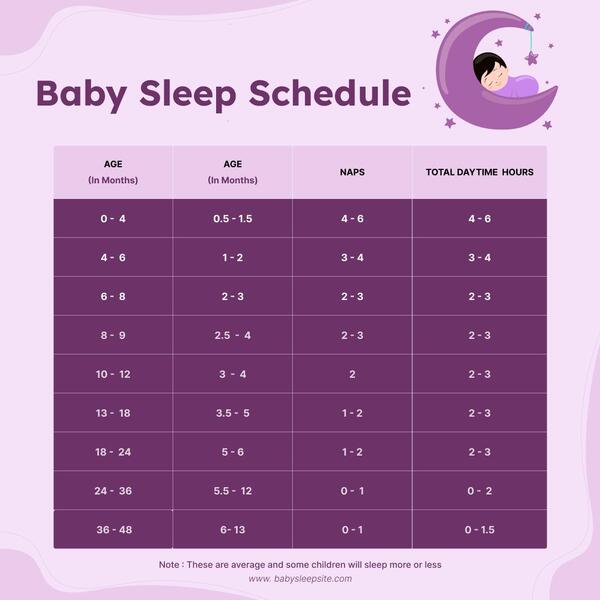Newborn Sleeping Hours: Sleep Needs by Age & Tips for Parents
Overview
Getting your newborn to sleep is one of the hardest challenges you will be facing as a new parent. During those first few months, while your baby spends more time asleep than awake, the when, where, and how of that sleep is unpredictable. This guide takes the guesswork out of it, helping you learn newborn sleeping hours, what healthy sleep looks like and more.
Introduction
Newborns spend their days drifting from one nap to another. In those first few months, sleep isn’t just for rest, but for their rapid brain and body development. Every nap builds memory, powers physical growth, and strengthens the immune system. Unlike adults, babies have shorter, more active bursts of sleep, which spark their neural connections. For parents, understanding their newborn’s sleeping hours can help them ensure that they get the rest they need. This is precisely what this guide covers. Read on to learn more about newborn sleeping hours.
How Many Hours Should a Newborn Sleep?
From the moment they are born, newborns look at sleep as if it is their full-time job. They are asleep for around 16 to 18 hours every day, including nighttime and naps. However, these are not long, uninterrupted stretches.
During the early weeks, their small stomachs can’t hold much. This means they wake up every 2 to 4 hours for a feed, just before going back to sleep. It doesn’t matter if it is daytime or nighttime. It is all the same for them.
Their sleep is sprinkled throughout the entire 24 hours. However, as the weeks pass, you will notice a shift. Your baby will be sleeping for longer periods of time, there will be fewer random naps, and you and your baby will be on a more predictable newborn sleeping hours schedule.
Baby Sleep by Age Group
0 – 2 Weeks
The first two weeks after your baby is born will be exhausting. Your newborn will do little else but sleep, clocking in up to 18 hours a day. However, it is not a neat schedule. Sleep comes in short bursts and is completely dependent on hunger. Whether your baby is bottle-fed or breastfed, he/she will be waking every 2 to 3 hours. Once they are fed, they will go right back to sleep. It is a continuous cycle of eating and sleeping.
3 – 4 Weeks
By the time your newborn is approaching a month old, they will have slightly longer periods of wakefulness. During the daylight hours, they will be taking in more of the world around them. Their awake moments will be more alert and interactive. A lot of babies start showing a preference for sleeping more at night. However, you will still have to get up for nighttime feeding.
1 – 2 Months
Around this time, your baby starts sleeping for 14 to 17 hours a day. They will also sleep for longer periods, sometimes up to 2 to 4 hours, before needing to be fed. While daytime naps might still be frequent, they will only last for 1 to 2 hours each. This stage is slightly easier because those intervals give them enough time to recharge.
2 – 3 Months
At this point, your baby’s sleep will have a more predictable schedule. There will be a clearer difference between day naps and nighttime rest. Some babies can manage 5 to 6 hours of stretches overnight, while others may wake more frequently. They will still be taking a lot of naps, which helps their growth and development.

Normal Newborn Sleep Patterns
Newborn sleep is different from the steady, deep sleep adults enjoy. In fact, about half of your newborn’s sleep is spent in the REM (Rapid Eye Movement) sleep, also called active sleep.
During this stage, you might see twitches, fluttering eyelids, tiny smiles, and even sudden jerks. This is completely normal and signals healthy brain activity.
One common reason for the sudden wake-ups is the startle reflex, which makes their arms flail unexpectedly. That is why swaddling is recommended, as it mimics the snugness of the womb and helps babies settle.
The feeding style of your baby also plays a role in their sleep patterns. Since breast milk is quickly digested, breastfed babies often wake more frequently. In the case of formula-fed babies, they experience longer stretches between feeds. However, there is no generalised newborn sleep pattern. Every baby sleeps at their own pace. Short-wakeups are normal and important for development, feeding, and bonding.
Signs of Healthy Sleep in Newborns
Healthy sleep in a newborn is a reassuring sign that they are healthy and well. Let’s take a look at them:
-
They will wake regularly for a feed. Once they are full, they will go back to sleep.
-
During their short awake windows, they remain calm, content, and curious about everything going on around them.
-
Steady weight gain and healthy growth are other green flags. It means that your newborn’s body is getting the energy and recovery it needs.
-
A newborn with a healthy sleep routine also has a fair consistency to their naps and nighttime sleep. However, even in this case, the exact timing can shift from day to day.
If your baby has moments of relaxed alertness, wakes up easily, and feeds without causing any fuss, you are on the right track.
When to Be Concerned About Sleep
Every baby is unique, and so is their sleep pattern. Their sleeping hours will vary. However, there are certain situations in which you should be concerned. Let’s take a look at them:
-
Your baby is sleeping less than 12 hours a day on average.
-
It's hard to wake your baby up to the point that feeding becomes a struggle.
-
Unusual lethargy, where they are unresponsive or floppy.
-
Inconsolable crying and persistent irritability
-
Poor feeding, not gaining weight as expected, frequent vomiting, and signs of dehydration.
If your newborn has any of these symptoms or their sleep patterns have suddenly changed, visit your paediatrician or a newborn hospital immediately. A quick check-up can give you the much-needed peace of mind and ensure early detection in your newborn.
Tips for Better Newborn Sleep
Establishing a Soothing Bedtime Routine
Newborns are capable of recognising gentle cues. If you create a calming pre-sleep ritual, it will help your newborn wind down and go to sleep more easily. This includes swaddling them snugly, dimming the lights, rocking them in your arms, playing soft white noise, etc. Over time, your newborn will become familiar with the repeated signals, making them feel secure and ready for bed.
Safe Sleep Practices (ABCs of Sleep)
When it comes to safe sleep practices, remember the ABCs of sleep:
-
A - Alone: Your baby should sleep in their own cot or crib.
-
B - Back: Your baby should always sleep on their back.
-
C - Crib: The crib should have a firm mattress. There shouldn’t be any toys, blankets, or pillows in it.
Following these rules reduces the risk of accidents and creates a safe environment for your baby to sleep.
Feeding and Burping Before Sleep
A well-fed baby will enjoy a longer stretch of sleep. Make sure that you burp your baby after feeding them to prevent gas. Gas can cause discomfort and wake your baby up.
Understanding Baby Cues
When your baby is ready to sleep, they give you cues in the form of yawning, fussiness, and rubbing their eyes. If you respond quickly, you prevent them from getting overtired, allowing them to sleep off peacefully.
Conclusion
During those early months, your newborn’s sleeping hours change a lot. While most babies sleep for around 16 to 18 hours, each one has its own pace. Some take short naps while others take a long rest. Both are perfectly normal. Deciding to track your baby’s sleep allows you to see patterns that help you support their growth and development. And as your baby grows, their sleep needs will change just as fast. If you notice sudden changes or are worried about their sleep pattern, talk to your paediatrician. A little reassurance can go a long way.
Frequently Asked Questions
Is It Normal for Newborns To Sleep All Day?
Yes, in the first few weeks, newborns sleep all day. They need this rest for growth.
When Do Newborns Start Sleeping Through The Night?
Most newborns sleep through the night for 6 months.
How Can I Tell If My Baby Isn’T Getting Enough Sleep?
If your baby isn’t getting enough sleep, they will be fussy, not feed properly, and have short, restless naps.
Should I Wake My Newborn To Feed at Night?
Yes, in the first few weeks, you should wake your newborn to feed them at night. This is especially crucial for babies who have not yet regained their birth weight.
What is The Safest Sleep Position for Newborns?
The safest sleep position for newborns is on their back, on a firm surface, without pillows or loose blankets.
What is The Normal Sleep Time for A Newborn?
A newborn sleeps for 16 to 18 hours, split into short periods.
How Long is it Okay For My Newborn To Sleep?
It is normal for newborns to sleep for up to 18 hours a day.



 Book Appointment
Book Appointment 9096453484
9096453484